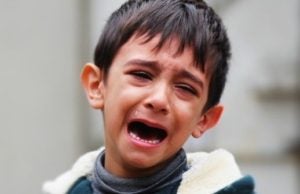 More than 2,300 children—an average of 65 per day—have been separated from their parents upon crossing the United States-Mexico border since the Trump Administration’s “zero tolerance” immigration policy was enacted on May 5.
More than 2,300 children—an average of 65 per day—have been separated from their parents upon crossing the United States-Mexico border since the Trump Administration’s “zero tolerance” immigration policy was enacted on May 5.
While our newsfeeds are littered with heartbreaking stories, even those of us with the deepest empathy for these families may not fully grasp the cost of the compounded trauma they endure. Layers of stressors mark their journey.
The separation of a child and parent is a traumatic event—one that in many cases is preceded by a perilous attempt to flee violence and volatility in their home countries. Many of these families came to this country legally seeking asylum from horrific, often life-threatening, conditions. If we were in their shoes, we would likely do the same to protect our children.
There are reports of children never returning after being taken away for a bath, or being pulled from their mother’s arms while breast-feeding only to end up in detention centers with no knowledge of their circumstances or their parents’ whereabouts. They have no one to console or care for them in a way that’s familiar and biologically necessary. Nithya Nathan-Pineau, of the Capital Area Immigrants Rights Coalition, said in an interview with National Public Radio, “We talk to these kids directly. What we’re seeing is that they are extraordinarily traumatized.”
Effects of Early-Life Trauma on Mental and Physical Health
This is inhumane. It is a civil rights and human rights issue that goes against our country’s founding ideals of liberty and justice. What’s more, this narrow-sighted policy has created a public health crisis in which hundreds of thousands of children and parents—including immigrants who live in the U.S. legally or have children who are citizens—must weather constant uncertainty and live with the effects of trauma and re-traumatization. Our public policies should do no harm. However, when they do, we must take ownership and mitigate adverse implications.
Extensive research on Adverse Childhood Experiences (ACEs) gives light to the detrimental effects of early-life trauma on health, behaviors, and life potential. According to the American Academy of Pediatrics, the health implications of family separation are long lasting. In many U.S. detention centers, detainees must sleep on cement floors, use open toilets, and have insufficient food and water.
In the short term, high levels of stress hormones compromise the immune system, and affect the child’s attachment with their parent or caregiver. “The separation of an infant, toddler, or child from his or her mother is devastating. Breaking this developmental bond increases the risk of long-term mental health and physical consequences, and in the short-term, loss of developmental achievements, changes in sleep, appetite, family and peer relationships, and academic performance can be expected,” said Dr. Octavio N. Martinez, Jr., executive director of the Hogg Foundation for Mental Health. “What is heart-breaking is that children have a tendency to internalize trauma, blame themselves for the separation, or believe their parent has abandoned them.”
In the long run, toxic stress impacts brain function and coping skills, and increases the risk for developmental digression, depression and post-traumatic stress disorder, as well as cancer, respiratory and heart disease, and diabetes.
In a letter sent to the Department of Justice, Department of Homeland Security, and Department of Health and Human Services last week, the American Psychiatric Association, in conjunction with 17 other mental health organizations, said, “…the longer that children and parents are separated, the greater the reported symptoms of anxiety and depression for the children.”
The executive order signed by President Trump last week did not end the “zero tolerance” policy that convicts adults crossing the border, and it does not change a thing for the parents and children separated since the policy took effect. It also provides little clarity about the road ahead.
How You Can Help—Right Now
Together, we can create greater and faster change. Here’s how you can help:
- For anyone disturbed by these events, including trauma-informed voices, call your Congressperson today to ask them to support policies that 1) reunite families and 2) provide comprehensive recovery resources for the children and adults impacted. Simply enter your address here to retrieve contact information for your elected officials. If you are unable to get through to their Washington, D.C. offices, call their local offices and leave a message.
- Check out a variety of ways you can help organizations mobilizing near the border.
- Social service providers, teachers and parents can use tools from the National Child Traumatic Stress Network’s Resources Related to Traumatic Separation, and Refugee and Immigrant Trauma.
- Psychiatrists can urge the Trump Administration to halt destructive immigration policies by completing this quick form on the American Psychiatric Association’s online Action Center.
- Attorneys who would like to assist detainees or the organizations working on the front lines of this crisis can check out the mobilizing efforts of Immigration Justice Campaign or this list of options. Additionally, the Texas Civil Rights Project seeks “volunteers who speak Spanish, Mam, Q’eqchi’ or K’iche’ and have paralegal or legal assistant experience.”
- If you or someone you know is in need of mental health supports, enter your zip code in the MentalHealth.gov Treatment Locator to find resources in your area.
